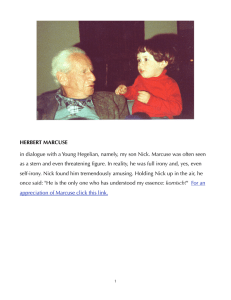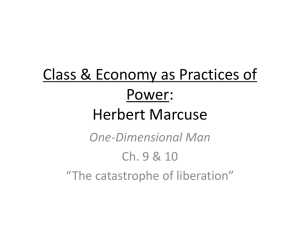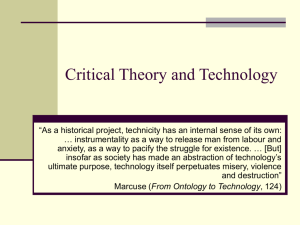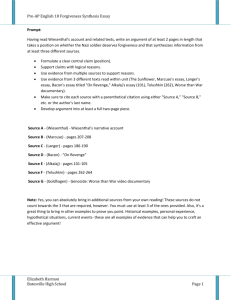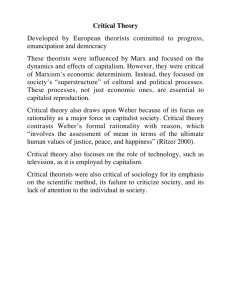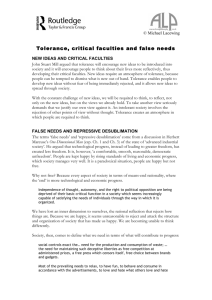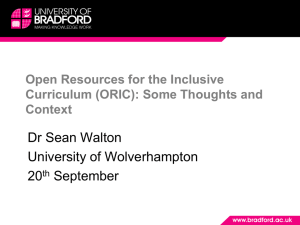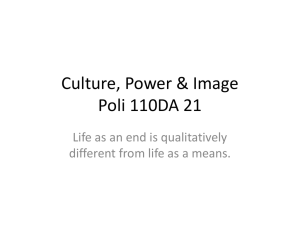The Task of Dialectical Thinking in the Age of One-Dimensionality
advertisement
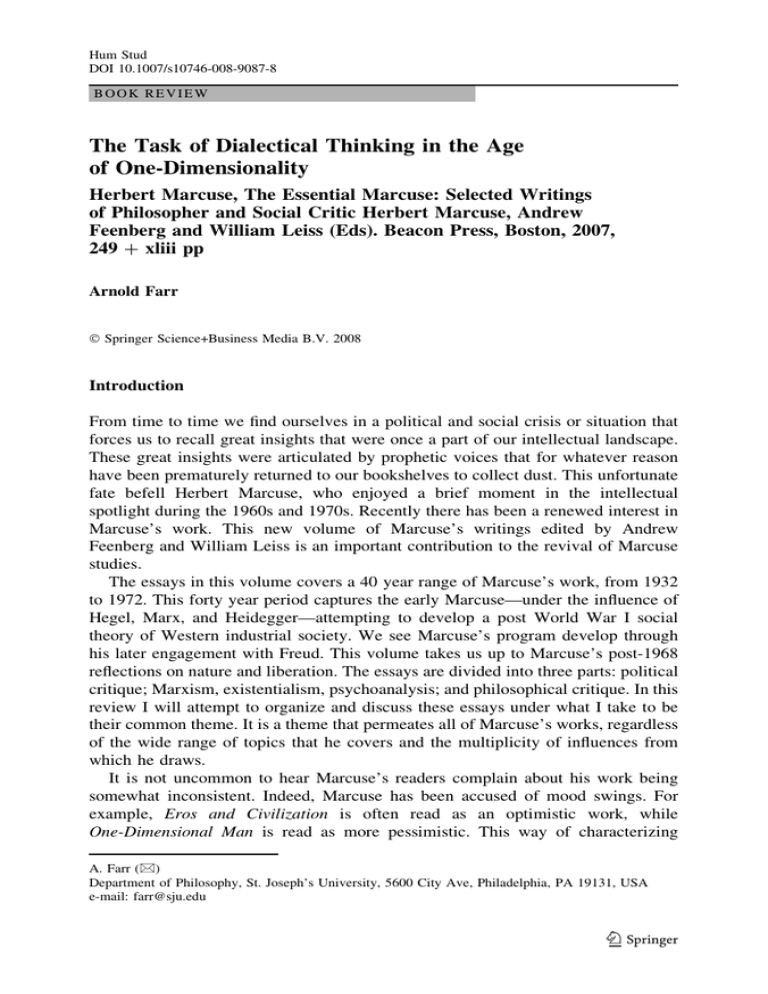
Hum Stud DOI 10.1007/s10746-008-9087-8 BOOK REVIEW The Task of Dialectical Thinking in the Age of One-Dimensionality Herbert Marcuse, The Essential Marcuse: Selected Writings of Philosopher and Social Critic Herbert Marcuse, Andrew Feenberg and William Leiss (Eds). Beacon Press, Boston, 2007, 249 + xliii pp Arnold Farr Ó Springer Science+Business Media B.V. 2008 Introduction From time to time we find ourselves in a political and social crisis or situation that forces us to recall great insights that were once a part of our intellectual landscape. These great insights were articulated by prophetic voices that for whatever reason have been prematurely returned to our bookshelves to collect dust. This unfortunate fate befell Herbert Marcuse, who enjoyed a brief moment in the intellectual spotlight during the 1960s and 1970s. Recently there has been a renewed interest in Marcuse’s work. This new volume of Marcuse’s writings edited by Andrew Feenberg and William Leiss is an important contribution to the revival of Marcuse studies. The essays in this volume covers a 40 year range of Marcuse’s work, from 1932 to 1972. This forty year period captures the early Marcuse—under the influence of Hegel, Marx, and Heidegger—attempting to develop a post World War I social theory of Western industrial society. We see Marcuse’s program develop through his later engagement with Freud. This volume takes us up to Marcuse’s post-1968 reflections on nature and liberation. The essays are divided into three parts: political critique; Marxism, existentialism, psychoanalysis; and philosophical critique. In this review I will attempt to organize and discuss these essays under what I take to be their common theme. It is a theme that permeates all of Marcuse’s works, regardless of the wide range of topics that he covers and the multiplicity of influences from which he draws. It is not uncommon to hear Marcuse’s readers complain about his work being somewhat inconsistent. Indeed, Marcuse has been accused of mood swings. For example, Eros and Civilization is often read as an optimistic work, while One-Dimensional Man is read as more pessimistic. This way of characterizing A. Farr (&) Department of Philosophy, St. Joseph’s University, 5600 City Ave, Philadelphia, PA 19131, USA e-mail: farr@sju.edu 123 A. Farr Marcuse’s work is mistaken. Marcuse was a dialectical thinker who analyzed social reality in terms of its present and actual oppressive and repressive structures while also pointing out the hidden emancipatory potential of the present social reality. This dialectical attitude is represented clearly in an essay in Part Two of this volume. This essay, ‘‘A Note on Dialectic’’ functions as a guide for understanding Marcuse’s form of critical theory. In this review I will use ‘‘A Note on Dialectic’’ as the key to interpreting other essays in this volume. The Function of Dialectical Thinking ‘‘A Note on Dialectic’’ was written in 1960 as a new preface to Marcuse’s Reason and Revolution: Hegel and the Rise of Social Theory, first published in 1941. The historical location of this new preface is of great importance for understanding Marcuse’s intellectual development and the consistency and continuity of his project. ‘‘A Note on Dialectic’’ represents Marcuse’s self-understanding of his project as he reflects on the purpose of a text written very early in his career. This reflection occurs between the publications of his two most famous and influential works, Eros and Civilization (1955) and One-Dimensional Man (1964). It is worth hearing Marcuse explain the purpose of Reason and Revolution in his own words: This book was written in the hope that it would make a small contribution to the revival, not of Hegel, but of a mental faculty which is in danger of being obliterated: the power of negative thinking. As Hegel defines it: ‘‘Thinking is, indeed, essentially the negation of that which is immediately before us.’’ Marcuse continues: Even Hegel’s most abstract and metaphysical concepts are saturated with experience—experience of a world in which the unreasonable becomes reasonable and, as such, determines the facts; in which unfreedom is the condition of freedom, and war the guarantor of peace. This world contradicts itself. (p. 64) As Marcuse says, ‘‘This world contradicts itself.’’ This contradiction is manifest in two ways. First, in terms of social reality and the perpetuation of injustice and inequality there is the contradiction between extreme poverty on one hand and unbridled wealth on the other. The point of Eros and Civilization was that this society contains the resources to overcome scarcity and end unnecessary exploitation and alienated labor. Yet, as our society accumulates more wealth and potential for liberation it becomes more oppressive. Secondly, this world contradicts itself in terms of its own self-understanding. That is, the rhetoric of who we are contradicts who we actually are. For example, we identify ourselves as a free society when many of our citizens are not free. We identify ourselves as a democratic when many of our citizens do not have the freedom to participate in the decision making processes by which they are affected. Members of the working class are told that they will achieve financial security if they work hard enough, even though they 123 Book Review remain in poverty while working harder and longer than those who reap the benefits of their labor. The function of dialectical thinking is to expose these contradictions. It is important to remember that even for Hegel the dialectic was not a method that one simply applied to phenomena. Things in themselves are dialectical. Therefore, dialectical thinking simply requires seeing things as they are. To see things as they are is not only to see them in terms of established facts, but rather, to see them in terms of their unactualized potential. Hence, dialectical thinking is negative thinking as it must negate the established social facts so that their emancipatory potential may be realized. However, the problem in advanced industrial society is that the ‘‘facts’’ are prioritized over their possibilities. Social domination is maintained by a systemic and systematic erasure of negative (dialectical) thinking. This theme runs through nearly all of Marcuse’s works. Progressive social change is prohibited by acceptance of the present order of things, acceptance of the ‘‘facts.’’ In several of his writings Marcuse discusses the problem of introjection or the internalization of oppressive/repressive values. His work on Freud, for example, discloses the way repression becomes voluntary. In an essay entitled ‘‘Freedom and Freud’s theory of Instincts,’’ included in this volume, Marcuse explains how individuals reproduce domination within themselves. Marcuse was cognizant of the fact that this self-imposed domination is to some extent rational for the purpose of self-preservation and self-development. A certain degree of freedom must be sacrificed for human beings to co-exist. However, this reproduced internalized domination extends itself beyond its realm of usefulness. A tension is created between the given form of life and its negation. The negation of the given form of life would result in greater freedom for the individual. However, the contradiction between the given form of life and the possibility of greater freedom is neutralized. Marcuse argues that ‘‘in the most technically advanced centers of the contemporary world, society has been hammered into a unity as never before; what is possible is defined and realized by the forces that have brought about this unity.’’ (p. 162) The attempt to revive dialectical thinking is not explicit in this essay on Freud but it is the motivating force behind it. This essay embodies the distinction that Marcuse made between basic and surplus repression in Eros and Civilization. Simply put, a certain degree of repression is necessary for the development of civilization and for the self-preservation and self-development of the individual. However, repression is carried beyond its necessary use. At the outset, repression is needed to secure some degree of happiness. As civilization develops the drive for happiness is repressed beyond what is necessary. This extra repression is called by Marcuse ‘‘surplus repression.’’ Although a certain amount of repression is needed for civilization, life still strives toward greater happiness and freedom (at least at the instinctual level). That surplus repression demands repression beyond what is needed runs counter to the drive for freedom and happiness. Hence, we find ourselves trapped in a contradiction. Marcuse’s point in the Freud essay is that this contradiction between our desire for happiness and freedom, and the impediments placed on the achievements of such, is ignored. Contradictions are unified in such a way that they are unnoticeable. This unity, however, is a false unity. This false unity is the creation of those who benefit 123 A. Farr from the present order of things. A passage from One-Dimensional Man is very telling here: The people enter this stage as preconditioned receptacles of long standing; the decisive difference is in the flattening out of the contrast (or conflict) between the given and the possible, between the satisfied and the unsatisfied needs. Here, the so-called equalization of class distinctions reveals its ideological function. If the worker and his boss enjoy the same television program and visit the same resort places, if the typist is as attractively made up as the daughter of her employer, if the Negro owns a Cadillac, if they all read the same newspaper, then this assimilation indicates not the disappearance of classes, but the extent to which the needs and satisfactions that serve the preservation of the Establishment are shared by the underlying population. (p. 8) Again, Marcuse expresses his concern over the way in which social contradictions are masked, whittled down, flattened out. The given is taken to be all there is. The possibility for social change is contained by symbols of a false equality. The trivial interests that people share in their daily lives is taken as occupying common ground. Poor and rich think of themselves as one if they cheer for the same football team. Political rhetoric creates the façade of unity amidst gross inequalities. We are told by political leaders that Terrorists have attacked the US because they hate the American way of life. They never specify which American way of life. Do they mean the way of life of the wealthiest members of American society? Do they mean the way of life of those American living in slums and ghettos? Do they mean the way of life of Americans who have the resources and social connections to attain the best education for their children? Do they mean the way of the Americans who must settle for the worst possible education because they lack the resources for better? When we go to war whose children are most likely to be targeted for military service? Who is dispensable and who is not in American society? Any attempt to answer such questions would reveal that we are not united in terms of freedom, equality, and the necessary resources for self-development and self-determination. Political Critique Part One of the book, entitled ‘‘Political Critique,’’ includes ‘‘The Individual and the Great Society,’’ ‘‘Remarks on a Redefinition of Culture,’’ and ‘‘Repressive Tolerance.’’ These essays are fine examples of the way Marcusean dialectical thinking works in a political context. They disclose a tension between our best political ideals and the social reality that prohibits the development and actualization of these ideals. I will use the essay ‘‘Repressive Tolerance’’ as an example. In our society tolerance is generally viewed as a virtue and an essential democratic principle. The co-existence of diverse social groups in a democratic society demands tolerance. Hence, tolerance is taken to be a liberating principle. However, Marcuse was also aware of the oppressive and repressive uses of 123 Book Review the principle of tolerance. Although the idea of tolerance has its origin in the struggle of oppressed peoples to overcome social domination, it is now used to further oppression and domination. It is used to mask, or flatten out, the social contradictions which victimize many people. Marcuse claims that ‘‘within a repressive society, even progressive movements threaten to turn into their opposite to the degree to which they accept the rules of the game’’ (pp. 34–35). The point here is that in a repressive society there is already an imbalance in terms of power, influence, resources, etc. To insert the principle of tolerance into a society that is already repressive may benefit the oppressors in that society. Social positions and the views and practices that maintain them are just views and ought to be tolerated. Hence, the worldview of any bigot is as valid as the worldview of any liberator. In such a society tolerance becomes a type of unifying concept that is designed to mask real social disunities or inequalities. Real social contradictions go unnoticed for the sake of tolerance. Tolerance is not an end in itself, but rather, it should be a means to an end. If tolerance is not an end in itself then it follows that some things should not be tolerated if they prohibit achieving the end for which tolerance is an instrument. That is, if real social justice and democratic equality is the end, we must be critical of any views that protect and maintain inequalities. We must seek to eliminate the contradiction between social facts and the potentially emancipator development of society. Marxism, Existentialism, and Psychoanalysis Part Two of this volume contains ‘‘A Note on Dialectic,’’ ‘‘The Foundations of Historical Materialism,’’ ‘‘Heidegger’s Politics: An Interview with Herbert Marcuse,’’ ‘‘Sartre’s Existentialism,’’ and ‘‘Freedom and Freud’s Theory of Instincts.’’ The essays in this section examine Marcuse’s engagement with several other important thinkers as he searches for not only a concrete philosophy but also a concrete theory of freedom. I’ve already discussed the importance of Hegel as disclosed in ‘‘A Note on Dialectic.’’ As the editors of this volume point out, ‘‘A Note on Dialectic’’ is important for understanding Marx’s ongoing engagement with Hegel. The depth of Marx’s engagement with Hegel was not known until the 1932 publication of Marx’s economic and philosophical manuscripts on 1844. The essay ‘‘The Foundations of Historical Materialism’’ was one of the first reviews of Marx’s text. Marcuse’s essay was written while he was still studying with Martin Heidegger. He thought that in Heidegger’s Being and Time he had found a concrete philosophy and a philosophical foundation for Marxism. Although his Heideggarian background helped him understand the ontological implications of Marx’s theory, Marcuse would soon discover that Heidegger’s philosophy was not the concrete philosophy that he was looking for. Marcuse’s criticisms of Heidegger and his disappointment in Heidegger’s affiliation with the Nazis is the subject of ‘‘Heidegger’s Politics: An Interview with Herbert Marcuse.’’ The last two essays in this section grapple with the problem of freedom. In the essay on Sartre, Marcuse rejects Sartre’s notion of freedom as too abstract. Sartre’s 123 A. Farr existentialism shares the same fate as Heidegger’s phenomenology to the extent that it is not a concrete philosophy. Sartrean freedom requires a turning inward and away from the real, concrete social conditions that hinder one’s freedom and which must be confronted and transformed to actualize one’s freedom. Sartre’s inward turn in fact works against the achievement of real concrete freedom and leaves us with no real possibility for the acquisition of freedom. In Freud, Marcuse finds a greater possibility for the actualization of freedom and a theory that assists us in understanding the impediments to freedom. The 1956 essay, ‘‘Freedom and Freud’s Theory of Instincts,’’ is a continuation of the project of Eros and Civilization, discussed above, first published in 1955. Philosophical Critique Part Three of this volume contains ‘‘Philosophical Interlude’’ which is Chapter Five of Eros and Civilization, ‘‘The Affirmative Character of Culture,’’ and ‘‘Nature and Revolution.’’ ‘‘Philosophical Interlude’’ is a brief overview of the dialectical tension in the concept of reason that has infected Western philosophy. From Aristotle to Hegel the Western concept of reason has produced what Marcuse calls a logic of domination. In Hegel this logic of domination is challenged by an image of reconciliation and a logic of gratification. However, in Hegel’s philosophy freedom and reconciliation occurs only in thought. Marcuse then turns to Nietzsche who provides us with a critique of this entire problematic. It is Freud’s metapsychology that provides us with a possible escape from the repressive framework of this tradition. However, both Nietzsche and Freud never fully escape the rationality of the dominant reality principle. In ‘‘The Affirmative Character of Culture’’ Marcuse continues to examine the ways in which critical consciousness or dialectical thinking is whittled down or undergoes erasure. The human desire for happiness is restricted to the freedom of the soul and the beauty of art. In ‘‘Affirmative Culture,’’ the soul is an internal unifying faculty that creates the façade of happiness in the midst of unhappy and alienating social conditions. Art is used to create the illusion of possessing beauty and happiness while the social conditions which produce unhappiness go unchanged. Marcuse demonstrates that those products of culture—such as art— which hold before us a vision of a better world are used to prohibit its actualization. The soul unifies contradictions that should instead be eliminated. In the final essay of this volume, ‘‘Nature and Revolution,’’ Marcuse examines the possibility of a new relationship between humanity and nature. This new relationship would produce a new sensibility in human beings. The exploitation of nature in capitalist societies has sanctioned the exploitation of human beings. A new and nonexploitative relationship with nature would lead to the creation of a new society. The emancipation of humanity cannot be separated from the emancipation of nature. Conclusion In their Introduction to this volume the editors remind us of Marcuse’s later theory of the two dimensions of society. Hopefully, I’ve shown that the theory of 123 Book Review the two-dimensions of society is implicit in all of Marcuse’s work, the scope of which is contained in this volume. From the beginning Marcuse was concerned with the potential for non-oppressive and non-repressive development in society. This potential is often in conflict with the ‘‘facts.’’ The facts—or rather, the present order of things—is oppressive but still contains the seeds for liberation. However, in a society that focuses on the ‘‘facts’’ the potential for liberation and real democratic freedom remains undeveloped. Marcuse’s theory of the two dimensions of society is dialectical to the extent that it recognizes the co-existence of oppressive and liberating mechanisms in advanced industrial society. The critical tools that Marcuse provided us have in recent decades been eclipsed by less critical and less emancipatory theories. Today we see the same kind of whittling down of critical consciousness that Marcuse fought against. We still see the rhetoric of freedom, democracy, tolerance, etc., used by the social elite to mask real social inequalities. In the domain of social theory there seems to be an absence of nerve with respect to confronting today’s social ills. In today’s political climate Marcuse’s voice is once again a fresh and liberating alternative to theory as usual. The recent revival of Marcuse’s work is a sign of the time. This prophetic voice from more than a generation ago is beginning to stir the social/political pot once again. The essays contained in The Essential Marcuse are important reading for those who are already Marcuse readers and for those who have just begun to read Marcuse. Although Marcuse’s work can be very difficult at times, the essays in this volume are very accessible. The reader will also be exposed to the wide range of Marcuse’s thought. The editors of this volume have done a great service for those of us interested in critical theory at its best. To them we owe many thanks. 123
